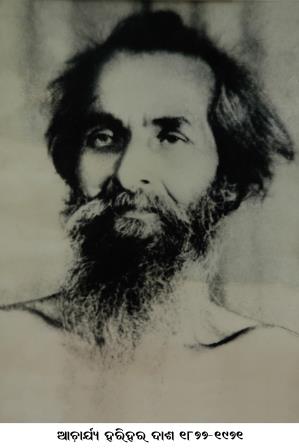Acharjya Harihara Das
Died :- 28-Feb-1971
Place of Birth :- Shreeramachandrapur, Puri

Embodiment of selfless service and dedication and one of the frontline freedom fighters, ideal teacher, educationist, social reformer and Bhoodan movement leader in Odisha, Acharya Harihar, popularly addressed as Acharya Mahasaya, was born to Mahadev Brahma and Sradha Devi on 8 march, 1879 in Sriramchandrapur village of Sakhigopal in Puri district. His educational career began at the village ‘chahali’ and the middle vernacular school, and then, at the Puri Zilla School. He did his F.A. from the Ravenshaw College. Though, he went to Calcutta to study LL.B, he could not complete the course amidst unfavourable conditions and left.
After education, Harihar worked as teacher in some schools at Nilagiri and Cuttack. In order to reform the naughty students at the Pyari Mohan Academy, he innovatively visited their houses and offered their parents to teach their wards freely. This metamorphosed the situation. While staying at Sahebzada Bazar with some of his students, he taught them self-reliance as well as yogasanas. Besides, he volunteered to distribute relief among the flood victims at Kakatpur involving the students in his effort. Harihar’s purpose was to create people of extra-ordinary calibre who could heroically fight the British rule. He wrote the ‘Child's Easy First Grammar’ to help students have a proper foundation of English language.
Harihar left Pyari Mohan Academy to join the Satyabadi Bana Bidyalaya, at Sakhigopal. The school was the brain child of Utkalmani Gopabandhu Das and Acharya Harihar. The school came into existence because of persistent efforts by Nilakantha, Godabarish, Krupasindhu, Basudev and Ananta. The basic objective of the school was to inculcate a sense of nationalism among the masses by a set of trained students who would take the lead.
As superintendent of the school’s hostel, he became popular among the students. Though the students referred to other teachers as 'Pundit', they addressed Harihar as 'Acharya'. When the school was closed down under compelling circumstances, Harihar worked for a ‘Bidhaba Ashrama’ at Puri. Widowed young girls of five/six years of age were brought there where all sorts of care like education, moral and mental development was extended by Acharya Harihar.
When Gopbandhu Das was imprisoned, he became editor of 'The Samaj'. After closure of the 'Bidhaba Ashram' amidst some trouble, he organised a 'Seva Samiti' of which people like freedom fighters and social-workers became members. Apart from serving the diseased, other works like Khadi, prohibition and social-reforms were carried out.
Following the death of Gopabandhu Das, Harihar, on the request of Gopabandhu Choudhury, took charge of the Swaraj Ashram at Cuttack. When Gopabandhu Choudhury was arrested during the Salt movement in 1930, Acharya Harihar led the march to Inchudi in Balasore, where he was arrested and imprisoned in Hazaribag jail for six months. Later he had to go to the same jail many times for anti-British activities.
Acharya Harihar spent hours in 'Harijan' slums sharing ‘pakhal’ rice with them, sometimes spinning thread with the girls, collecting funds and instructing them to construct latrines for self-use.
The creation of a separate province of Odisha saw many leaders run after power; but Harihara kept aloof from such pursuit and devoted his time for development of the villages.
He was unanimously nominated President of the Provincial Congress Party at a meeting where Gopabandhu Chowdhury and Pandit Nilakantha Dash were contestants. Inspired by the Quit India Movement call by Gandhiji in the year 1942, Acharya Harihar and other freedom fighters actively participated in the movement. They were imprisoned at Berhampur jail. School and college students who joined the movement were also jailed. Acharya taught these young patriots inside the jail, putting in hard labour. Here he translated the Bhagabat Gita. He was released after two years.
Harihar took initiative for mosquito eradication in Puri district. Both Pandit Krupasindhu and he cleaned algae from the ponds and tanks on particular days despite non-cooperation by the Zilla Board.
Harihar became active member of the Bhoodan Movement and accompanied Vinobajee from village to village in the year 1955. He presided over the 12th Annual Conference of Sarvodaya Sammilani held at Sevagram on 26th March, 196. This great soul untiringly worked for the uplift of the people and passed away on 29 February, 1971. He will, for ever, be in the hearts of the people for his selfless service and dedication.
Books
Poetry
Plays
Eassays
Copyright © 2024 Odia Virtual Academy. All rights reserved Total Visitors- 1
Powered by: Odia Virtual Academy

